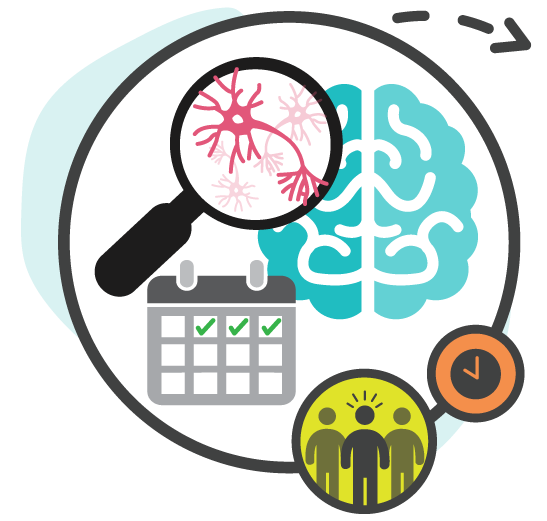Research in the field of brain-plasticity-based cognitive training is the foundation for everything we do at Posit Science. We led some of the first large-scale multi-site clinical trials of computerized cognitive training programs, and our partnerships with independent grant-funded researchers have led to more than 200 published papers in peer-reviewed publications. We currently partner with more than 300 independent research groups using BrainHQ in their grant-funded studies. If you are interested in using a well-validated cognitive training program in your own research, then please fill out our Research Request Form.
Using BrainHQ In Your Research Study
Manage Users: Create and manage accounts using group licenses for your study participants through the secure web-based group portal. Add and remove participants as needed. Organize your participants into groups to align with your study design.
Supervise Progress: Review usage, progress, and performance of participants through the group portal to provide in-person or remote coaching to ensure protocol compliance. See all your participants in summary through the group portal, or log in as a specific participant to see exactly what your participants see.
Report on Activity: Keep track of your participants. Download detailed reports on individual user activity, or summary reports for your entire group.
Control Training: Apply custom settings to the personal trainer to give your participants specific exercises selected by you. Ensure participants focus on the training you have picked by removing features your users don’t need, like individual exercises or the ability to skip exercises.
Maintain Participant Anonymity: Rely on our HIPAA compliant procedures and our SOC-2 security certification to store participant data, or choose to anonymize participants and only specify participant IDs.
Use Control Games: Use ordinary computer games, such as solitaire, word search, and sudoku among others, delivered on the BrainHQ platform as a control activity for your randomized controlled trial.
Use Assessments: Use BrainHQ exercise-based assessments as positive controls for task learning to strengthen your assessment batteries.
Administer the Useful Field of View assessment: Provide the UFOV assessment and the validated Crash Risk Evaluation to your patients. Advise patients about their driving safety risk. Move them to BrainHQ training to improve their UFOV and their driving safety. Learn more about the UFOV assessment here.
Proven Benefits for Researchers
Rewire the Brain: Improve brain health by increasing the activation of brain regions related to specific cognitive functions, improving network connectivity, and improving the speed at which information flows through the brain.
Sharpen Cognitive Function: Deliver key cognitive benefits proven in multiple gold-standard randomized controlled trials, including faster cognitive speed, sharper attention, better memory, stronger executive function, and an expanded useful field of view.
Improve Everyday Life: Help your participants with real-world benefits, including faster everyday speed, improved instrumental activities of daily living, better mobility, reduced at-fault auto crash risk, improved mood, and higher health-related quality of life.
Research Studies Using BrainHQ
BrainHQ exercises have been used in some of the largest randomized controlled trials of cognitive training ever done, including ACTIVE, IHAMS, and IMPACT. BrainHQ is currently being used in a number of the Worldwide FINGER studies, including the US POINTER study in the the United States, as well as FINGER studies in Latin America, Ireland, Japan, Australia, and the Netherlands, and has been used in trials in healthy adults, ADHD, bipolar disorder, cancer-related cognitive impairment, mild cognitive impairment, dementia, depression, diabetes, heart failure, HIV-related cognitive decline, multiple sclerosis, Parkinson’s disease, schizophrenia, stroke, substance-use disorders, tinnitus, and traumatic brain injuries.
Training schedules vary with respect to the number of minutes per session, number of sessions per week, and the number of weeks in total. Most successful trials implement schedules that last 20-60 minutes per session, 3-7 times per week, for a total of 6-24 weeks or more. Strive for a minimum of 2 hours per week and 10 hour of training total overall. Lower doses are generally ineffective in driving adaptive cognitive and functional change.
The most commonly used training schedules include the Focus on Auditory Processing which uses a collection of six interrelated training exercises that in aggregate span the acoustic organization of speech from frequency-modulated sweeps through syllables, short words, sentences, and narratives, and the Focus on Visual Processing which uses a collection of five interrelated training exercises to improve the speed and accuracy of visual information processing.
Use BrainHQ In Your Research
Learn more about pricing for group BrainHQ licenses, then start your free 30-day, no obligation group trial.
Resources for Using BrainHQ in Your Research
Find our comprehensive guide to doing research with BrainHQ here, and our comprehensive guide to using BrainHQ assessments here.
Participant compliance can be improved greatly by touching base with each of your participants one-on-one either in person or over phone at least once per week using our weekly check-in template.
You can share additional materials and curated information which includes scientific content geared toward laypersons, newsletters, podcasts, and videos, commonly encountered issues, and how to build rapport with your participants. A repository of additional videos are located here. These materials will set up your participants for success by helping them understand the program and motivating them to continue engaging with their training.
The scientific literature in our field is scattered across many journals. We have compiled a shared online database of clinical trials in brain training. Note that this database includes most of the trial literature on brain training across various developers. If you only want to read clinical trials using BrainHQ software, then please enter ‘Posit Science‘ into the filter tag box on the left-hand side. Also note that a number of other tags exist (e.g., schizophrenia, healthy aging, stroke, MCI, TBI, far-transfer, ACTIVE). You can click to highlight these tags — again, making sure ‘Posit Science’ remains highlighted — to filter the database by the condition, outcome, or trial you’re interested in researching.
We have a slide deck on the basic and applied science of BrainHQ. If you would like to read about brain plasticity and BrainHQ’s theoretical framework more generally, we suggest starting with some reviews of brain plasticity (Buonomano 1998), then a review of how negative brain plasticity causes cognitive dysfunction (Mahncke 2006), then a more recent review uniting brain plasticity and therapeutic development (Nahum 2013), and finally a paper showing the neurological consequences of plasticity-based brain training in the rat model (de Villers Sidani 2010). Each of those is well-referenced and can provide an introduction into the deeper literature showing how to reorganize brain function with brain training.





